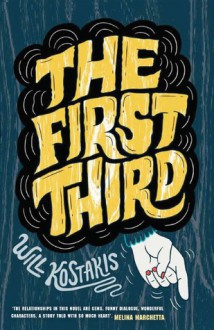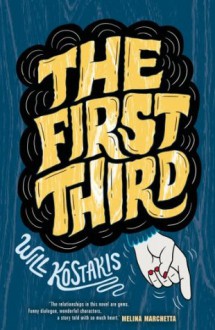
I talked to the real Sticks for like an hour at Will's Melbourne launch - real nice guy, and incredible with the number of common interests we had.----------------------It’s not often that you come across a book that you feel like it is your story on the page and not some imaginary character’s or the author’s. Although I’m not Greek, I related – the cultural theme was general enough to apply to all cultures, and most of all any European nationality (I’m Maltese and Serbian so everything in The First Third was basically spot on). My parents are divorced, and it was eerily scary how similar my parents are to Bill’s. Bill is the middle child of three sons; I’m the youngest with two older sisters – I still related to Bill. Bill watches his yiayia make moussaka; I watch my baba (Serbian, well, Macedonian side) make maznik (the most well known Macedonian pastry dish). Bill’s desires are somewhat mine too. So Will Kostakis’s The First Third is without a doubt my favourite contemporary novel I’ve read this year, and that’s a big compliment as contemporaries and me don’t mix well together as I feel like I’ve read many before. But in The First Third’s case, I read the entire book thinking that not one aspect of it was boring or generic or uninventive. Kostakis has written a completely original story, using his own life – most importantly his family and yiayia – in a relevant manner to be enjoyed by all, with characters you can’t help to love and laugh and cry with.By the way, see how it’s blurbed by Melina Marchetta? That means you have to purchase it. Now.Seriously. Food. This book is a Greek feast.Besides the food, The First Third basically involves Bill Tsiolkas’s yiayia (grandmother) falling ill. Bill then goes on a quest to make things right, the way his yiayia wants things to be, directed by a “bucket list” she gave him on her hospital bed:1. Find your mummy a husband2. Have Simon girlfriend in Sydney3. Fix PeterWith the help of his gay best friend Sticks (Lucas) who has cerebral palsy, Bill discovers ways to tick these objectives off of his yiayia’s list, to help these three – well, four, including his yiayia by completing the list – key people in his life. As he attempts to correct them, he finds the truth about his father, helps Sticks to be who he is and not shy away from his disability, and falls in love himself. Sometimes it wasn’t easy helping someone who didn’t want to be helped, and although it took Bill much effort and many attempts to achieve these things for his yiayia, with his determination to support and comfort his family and friends he holds his family together even in the toughest times. (It is not the events that will spoil you, but the interactions with others and the ways in which Bill achieves these things.)It’s going to get a bit personal here… What struck home to me the most wasn’t that I had lost someone like my grandparents who hold their cultures so close to their hearts that it is often lost in this technologically advanced and modern world, nor was it that I too attempt, no matter how difficult, to help and be there for my mother and siblings just as Bill was for his. What struck a chord with me, what resonated with me so deeply, was with Bill’s father.When Bill was young his dad left, escaped. He never helped Bill and his siblings with anything, he wasn’t there for them. Although mine is not a direct reflection of Bill’s, there are some elements that are relatable. Just like Bill, I really didn’t have a father figure growing up in my teen years. Maybe after a year my parents separated at the beginning of 2006 (first day of year 8, mind you) my dad escaped to the Gold Coast – to me, to escape all the responsibilities of having to care for his children. He found someone and lives with her (I don’t object though because she’s nice as). Unlike Bill I still communicate and contact with my dad here and then and see him when I can, but somewhat like Bill’s dad my dad rarely helps us when we desperately need something – there’s always excuses. And yet although he doesn’t have two kids like Bill’s he has two dogs, which he pays more attention to, uses more money towards, and every-fucking else, more for them than his own children, my sisters and I.To relate so heavily with a single character, even if based on one’s own life, shows that there is honesty and truth in the writing, a voice so powerful that it is hard to ignore. To use someone in your life as an example to help another is what I’ll be doing more often now, thanks to Bill.I love the relationships in The First Third. Bill’s dynamic with his best friend Sticks was one in that they were born to be friends. His relationship with his yiayia is one that I see in mine with my nanna and my baba, and probably my favourite of the book. It was funny and endearing, and from the very beginning this relationship was pure. Just as sincere was Bill’s relationships with his mother and his brothers, Simon and Peter, a family open yet so distant, fractured in ways unknown, the glue holding them together wearing down.‘I understand grandparents aren’t forever,’ I said… ‘… with Papou it was slow.’…‘But Yiayia… She’s the same. She’s exactly as I remember her. She hasn’t changed. And I… I can’t lose her when she still knows my name. I haven’t had time to get used to not having her around.’‘She’ll be fine,’ Lucas said.I wasn’t sure if I believed him.‘I was talking to her today. She said you can split life into three parts.’ I swallowed hard. ‘You spend the first third getting embarrassed by your family. When they pass away, you spend the next part trying to make a family like the one you had. And when you’re old, you just embarrass whatever family you’ve made.’‘I’m sure that’s an oversimplification.’‘And if it’s not? When Yiayia goes, that’s it. She’s my last grandparent. I’ll be in the second third. I suck at second-third stuff. I kiss girls; they run away. I’m not ready, Lucas. Why can’t I stay here forever?’‘It doesn’t work like that,’ he said. ‘We grow up, stuff changes.’…‘I’m holding on to the tail-end of her life and I know, no matter how hard I hold on, she’s going to slip between my fingers and I’m going to lose her forever.’ And saying it out loud, my composure shattered. Tears were streaming down my face and I struggled to get the words out. ‘I don’t know how I’m going to live without her.’The First Third will surely have you reflecting on your own family life, who is important to you and who to help the most. To sacrifice everything for your family is a theme that runs deeper than the blood that is shared, but something much greater, much more important. To cherish is to live. To support is to love.You can learn a thing or two from Bill as well.


 Log in with Facebook
Log in with Facebook 










